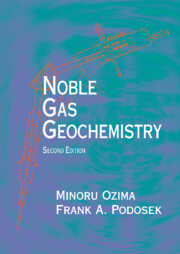Preface to the First Edition
Published online by Cambridge University Press: 18 August 2009
Summary
In addition to being the collective name for the elements in the rightmost column of the periodic table of the elements, the term “noble gases,” also “rare gases” or occasionally “inert gases,” is a convenient label for the branch of the scientific enterprise concerned with studying the occurrence and distribution of these elements in nature, particularly in the earth and the terrestrial planets. This research area is usually considered part of geochemistry, although other labels would serve as well.
The most familiar and most widely practiced area of geological research involving noble gases is, of course, geochronology, especially K–Ar dating. There are many good books about geochronology and it is not our intention to try to add another. Noble gas geochemistry, the subject of this book, will mean here what it usually suggests in the geological and planetary science community: the study of the natural occurrence of noble gases and what may be learned thereby, other than determination of the ages of rocks.
In the last two decades the discipline of noble gas geochemistry has prospered, at least by the measure of getting its own sessions at scientific conferences and attracting practitioners in sufficient numbers that, regrettably, they no longer all know each other or are even familiar with each other's work. In spite of its fruits, however, noble gas geochemistry often seems to non-practitioners to have much the air of the secret society and its dark art.
- Type
- Chapter
- Information
- Noble Gas Geochemistry , pp. xiii - xivPublisher: Cambridge University PressPrint publication year: 2001



